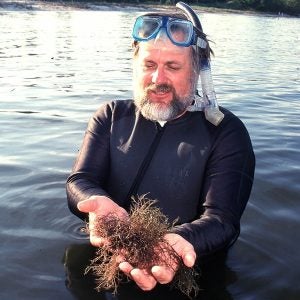 Coral reefs are beautiful to behold, but they also play an important role in marine ecosystems by providing habitats and shelter for marine organisms. Reefs also protect coastlines from damaging storms.
Coral reefs are beautiful to behold, but they also play an important role in marine ecosystems by providing habitats and shelter for marine organisms. Reefs also protect coastlines from damaging storms.
An oceanographer at Florida Atlantic University will discuss one of the deepest coral reefs in the United States—Pulley Ridge—during the next Vetlesen lecture at the University of Rhode Island.
M. Dennis Hanisak, a research professor at Florida Atlantic’s Harbor Branch Oceanographic Institute and director of its Indian River Lagoon Observatory, will present his research at 4 p.m. Wednesday, Nov. 1 in the Coastal Institute Auditorium at the Graduate School of Oceanography, 215 South Ferry Road, Narragansett. The event is free and open to the public.
Up to 265 feet deep 100 miles west of Key West in the southern Gulf of Mexico, Pulley Ridge is the deepest light-dependent coral reef in the United States. Known as mesophotic ecosystems, these reefs are a refuge for species of corals and fish that are stressed or dying in shallow water from global warming, disease, fishing pressure, and sedimentation from human activities.
Hanisak is a part of a collaboration of scientists studying coral reefs from Pulley Ridge to the shallow-water reefs in the Florida Keys. Results of the study—funded by the National Oceanic and Atmospheric Administration—will help experts develop more effective strategies to protect the reefs.
In his research—culled from videos taken on remotely-operated vehicles during deep-sea expeditions—Hanisak discovered a catastrophic 93 percent loss of coral on Pulley Ridge’s main ridge. He attributed the loss to cold water upwelling, hurricanes, disease and river runoff.
“But we also discovered dense populations of corals in an area never previously explored,” he says. “Our data are an important baseline to better understand the long-term health and status of mesophotic coral ecosystems and are being used for making management decisions about these habitats.”
Hanisak received his doctorate in biological sciences from the University of Rhode Island in 1977. His research in Florida, the Bahamas and the Caribbean focuses primarily on the biology and ecology of marine plants, particularly seaweeds and seagrasses.
The lecture series is sponsored by the G. Unger Vetlesen Foundation and presented by URI’s Graduate School of Oceanography. Since its founding in 1955, the Vetlesen Foundation has advanced prominent oceanographic and earth science institutions in the United States.
Media Contact:
Elizabeth Rau
401-874-2116
